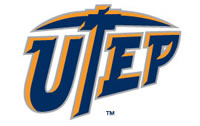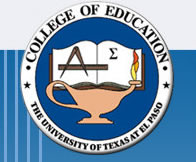
Bill Robertson, Ph.D. - Classes
Teacher Education Department
TED 5314 - Concept-Based Science Education
Syllabus ( Available in PDF)
Available in PDF)
Instructor: Dr. Bill Robertson
Phone: 747-8608
Office: Education Building, Room 606
Email: robertson@utep.edu
Web Site: http://utminers.utep.edu/robertson/classes/ted5314/default.htm
Office hours: By Appointment
Class Meetings
4:30 PM - 7:20 PM MTWR - Education Building 405
May 30, 2006 - June 22, 2006
Course Description
Concept-Based Science Education develops and applies understanding of field, community, and cultural resources and develops family and community partnerships in a relevant science context. Students develop a learning unit based on instructional models such as the learning cycle lesson design and the 5-E model. Concept-Based Science Education explores historical perspectives of science and the role of science in societal decisions. The class includes research-based principles in science learning and technology integration.
The class utilizes a Problem-based learning (PBL) approach to curriculum development and delivery. Problem-based learning (PBL) is an inquiry-based approach that can be defined as both a curriculum and a process. The curriculum consists of carefully selected and designed problems that engage the learner in the process of acquiring critical knowledge, developing proficiency in problem solving, engaging in self-directed learning, and participating in collaborative teams. This curriculum integration process engages students in collaborative research that can be shared in the classroom, across a community or around the globe. PBL features open-ended and cooperative activities that deal with real world issues and scenarios.
The curriculum approach will follow the Critical Thinking Curriculum Model (CTCM), which is a multidisciplinary approach designed to encompass computer technology, a current real world issue, and effective learning and teaching practices. As a PBL curriculum, it encompasses the political, social/cultural, economic, and scientific realms in the context of a global issue. In this way, students realize the importance of their schooling by applying their efforts to an endeavor that ultimately will affect their future.
Course Goals
- To provide opportunities to develop and apply critical thinking and problem solving skills through open ended approaches in meeting specific course objectives and goals
- To articulate the connections between scientific concepts and everyday life.
- To identify and articulate conceptual understandings and desired outcomes within a problem-based learning curriculum.
- To engage in class discussions and assignments that requires the integration of skills in content development and content delivery.
- To analyze and synthesize an understanding of course material in both classroom and online environments through multiple classroom interaction strategies.
- To increase understanding of technology integration in articulating a concept-based science education curriculum product.
Text
Lynn Erickson (2002) Concept-Based Curriculum and Instruction: Teaching Beyond the Facts, H. Corwin Press, Inc., Thousand Oaks, CA - ISBN # 0761946403 (paperback)
Required Software
Inspiration 7.5 (Educational or Full Version) is the professional choice for building concept maps and schematic diagrams. It provides a powerful combination of visual layout tools, import/export features, and diagramming of models. Students build graphic organizers to represent concepts and relationships and use the integrated outlining capability to further organize ideas for reports.
Other Course Materials
Additional Articles will be posted as links and/or as handouts for students to read prior and will be assigned regularly.
Grading
A: 90% - 100%, B: 80% - 89%, C: 70%-79%, D: 60%-69%, F: <60%
The overall grade for the class for each student will be calculated as follows: 20% daily attendance & participation, 20% short reflection papers (2), 20% quizzes(2) and discussions(3), 30% Final Product Development, 10% Final Product Presentation.
Academic Dishonesty
Academic dishonesty is prohibited and is considered a violation of the UTEP Handbook of Operating Procedures. It includes, but is not limited to, cheating, plagiarism, and collusion. Cheating may involve copying from or providing information to another student, possessing unauthorized materials during a test, or falsifying research data on laboratory reports. Plagiarism occurs when someone intentionally or knowingly represents the words or ideas of another person’s as ones’ own. And, collusion involves collaboration with another person to commit any academically dishonest act. Any act of academic dishonesty attempted by a UTEP student is unacceptable and will not be tolerated. Violations will be taken seriously and will be referred to the Dean of Students Office for possible disciplinary action. Students may be suspended or expelled from UTEP for such actions.
Students with Disabilities
If you have or believe you have a disability, you may wish to self-identify. You can do so by providing documentation to the Office of disabled Student Services located in Union E Room 203. Students who have been designated as disabled must reactivate their standing with the Office of Disabled Student Services on a yearly basis. Failure to report to this office will place a student on the inactive list and nullify benefits received. If you have a condition which may affect your ability to exit safely from the premises in an emergency or which may cause an emergency during class, you are encouraged to discuss this in confidence with the instructor and/or the director of Disabled Student Services. You may call 747-5148 for general information about the Americans with Disabilities Act (ADA).
Syllabus | Schedule | Research Assignments| Discussions | Student PBL Products| Evaluation | Resources | Links

Bill Robertson, Ph.D. (robertson@utep.edu)
Teacher Education Department, College of Education, University of Texas at El Paso